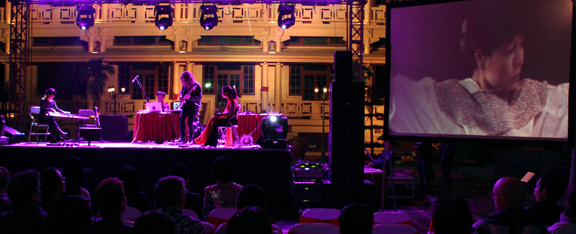In classical western music, the composer has been at the top of a hierarchy and the musical work has been at the center of musical experience. The development of concert hall culture further enforced a disconnection between music as a shared experience and the structures of professional music making. Listening becomes a matter of being silently exposed to a musical experience where the correct interpretation of a musical message is the common goal. Since 2006, The Six Tones have been developing an artistic practice that challenges hierarchical constructions of musical experience and instead puts the focus on how music is essentially a shared phenomenon. We invite composers, performers and artists in other fields to collaborative projects that cross the boundaries between disciplines and between cultures.
What is the signification of conforming to the traditions of an idiomatic style of improvisation? From a political perspective, the answer is highly dependent on the context. When the Chinese sheng player Wu Wei joined the Vietnamese/Swedish group The Six Tones in a performance of Hề Mồi (we here refer to a performance in a festival in 2011), a Vietnamese tune from traditional Chèo theatre, an exploration of the boundaries between distinct idiomatic traditions (musical idioms that have always had a political significance) was launched through a dialogue that would have been unthinkable without the freedom of mind that may emerge from the openness of true listening.
An important shift in our own understanding of our practice occurred in 2009-10 when we began to work more extensively with musicians on the experimental music scene in Hanoi. In the work of electronic musicians such as Vũ Nhật Tân and Trí Minh, the way in which the Japanese composer Toru Takemitsu in the 1960’s localized the heart of experimental music in USA and Europe is countered by an emerging musical scene, largely independent of the ancient historical hierarchies of European electronic music and a door opened up to new sounds, possibilities and modes of listening.
By situating intercultural musical practice in a wider discourse, a politicization may be said to occur. However, it is the resonance within the listening subject that reveals the political nature of all artistic practice. This has very little to do with what is commonly referred to as political art and goes beyond any specific modelling of the artistic output along political lines.

